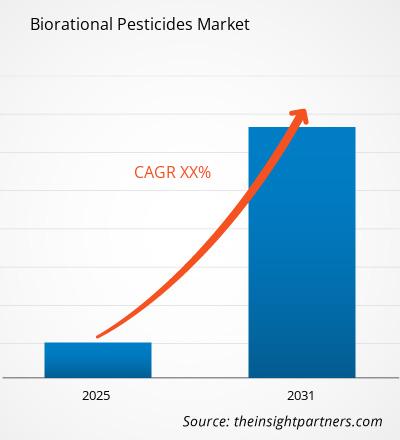MARKET INTRODUCTION
A biorational pesticide is defined as any pesticide material that relatively causes no harm to humans or animals, and does no damage to the environment. An example of a biorational pesticide is citronella products. Citronella is plant based and effective in repelling bugs and mosquitos. Various type of biorational pesticide includes botanicals, microbial pesticides, minerals, and synthetics.
MARKET DYNAMICS
The biorational pesticides market has witnessed significant growth owing to factors such as consumer shift toward organic foods and heavy crop loss due to pest attacks. Evolving farming practices & technology help boost the growth of the biorational pesticides market. However, limited product availability and low shelf life of biorational pesticides is projected to hamper the overall growth of the biorational pesticides market.
MARKET SCOPE
The "Global Biorational Pesticides Market Analysis to 2031" is a specialized and in-depth study of the Chemicals and Materials industry with a special focus on the global market trend analysis. The report aims to provide an overview of the biorational pesticides market with detailed market segmentation by sorce, application, crop type, formulation, type and geography. The global biorational pesticides market is expected to witness high growth during the forecast period. The report provides key statistics on the market status of the leading biorational pesticides market players and offers key trends and opportunities in the market.
MARKET SEGMENTATION
The global biorational pesticides market is segmented on the basis of sorce, application, crop type, formulation and type. On the basis of source, the biorational pesticides market is segmented into botanical, microbial, non-organic, and others. The botanical segment is divided into pyrethrin, azadirachtin & neem oil, rotenone, and others. The microbial is divided into bacillus thuringiensis, beauveria bassiana, and others. Based on application the global biorational pesticides market is divided into Foliar spray, soil treatment, trunk injection, others. On the basis of crop type, the market is catagorised into fruits and vegetables, cereals and grains, oilseeds and pulses, others. Based on formulation the market is bifurcated into liquid and dry. On the basis of type biorational pesticides market is segmented into biorational insecticides, biorational fungicides, biorational nematicides, and others.
REGIONAL FRAMEWORK
The report provides a detailed overview of the industry including both qualitative and quantitative information. It provides an overview and forecast of the global biorational pesticides market based on various segments. It also provides market size and forecast estimates from the year 2021 to 2031 with respect to five major regions, namely; North America, Europe, Asia-Pacific (APAC), Middle East and Africa (MEA) and South America. The biorational pesticides market by each region is later sub-segmented by respective countries and segments. The report covers the analysis and forecast of 18 countries globally along with the current trend and opportunities prevailing in the region.
The report analyzes factors affecting the biorational pesticides market from both demand and supply side and further evaluates market dynamics affecting the market during the forecast period i.e., drivers, restraints, opportunities, and future trend. The report also provides exhaustive PEST analysis for all five regions namely; North America, Europe, APAC, MEA, and South America after evaluating political, economic, social and technological factors affecting the biorational pesticides market in these regions.
MARKET PLAYERS
The reports cover key developments in the biorational pesticides market as organic and inorganic growth strategies. Various companies are focusing on organic growth strategies such as product launches, product approvals and others such as patents and events. Inorganic growth strategies activities witnessed in the market were acquisitions, and partnership & collaborations. These activities have paved way for the expansion of business and customer base of market players. The market payers from biorational pesticides market are anticipated to lucrative growth opportunities in the future with the rising demand for biorational pesticides in the global market. Below mentioned is the list of few companies engaged in the biorational pesticides market.
The report also includes the profiles of key companies along with their SWOT analysis and market strategies in the biorational pesticides market. In addition, the report focuses on leading industry players with information such as company profiles, components, and services offered, financial information of the last 3 years, the key development in the past five years.
- Bayer
- Syngenta
- Monsanto Bioag
- BASF SE
- Gowan Company, LLC
- Valent Biosciences
- Isagro SAP
- Koppert
- Marrone Bio Innovations
- Russell IPM
The Insight Partner's dedicated research and analysis team consist of experienced professionals with advanced statistical expertise and offer various customization options in the existing study.
Biorational Pesticides Report Scope
| Report Attribute | Details |
|---|---|
| Market size in 2023 | US$ XX Million |
| Market Size by 2031 | US$ XX Million |
| Global CAGR (2023 - 2031) | XX% |
| Historical Data | 2021-2022 |
| Forecast period | 2024-2031 |
| Segments Covered |
By Source
|
| Regions and Countries Covered | North America
|
| Market leaders and key company profiles |
- Historical Analysis (2 Years), Base Year, Forecast (7 Years) with CAGR
- PEST and SWOT Analysis
- Market Size Value / Volume - Global, Regional, Country
- Industry and Competitive Landscape
- Excel Dataset

Report Coverage
Revenue forecast, Company Analysis, Industry landscape, Growth factors, and Trends

Segment Covered
This text is related
to segments covered.

Regional Scope
North America, Europe, Asia Pacific, Middle East & Africa, South & Central America

Country Scope
This text is related
to country scope.
Trends and growth analysis reports related to Chemicals and Materials : READ MORE..
The List of Companies
1. Bayer
2. Syngenta
3. Monsanto Bioag
4. BASF SE
5. Gowan Company, LLC
6. Valent Biosciences
7. Isagro SAP
8. Koppert
9. Marrone Bio Innovations
10. Russell IPM
1. Bayer
2. Syngenta
3. Monsanto Bioag
4. BASF SE
5. Gowan Company, LLC
6. Valent Biosciences
7. Isagro SAP
8. Koppert
9. Marrone Bio Innovations
10. Russell IPM



 Get Free Sample For
Get Free Sample For